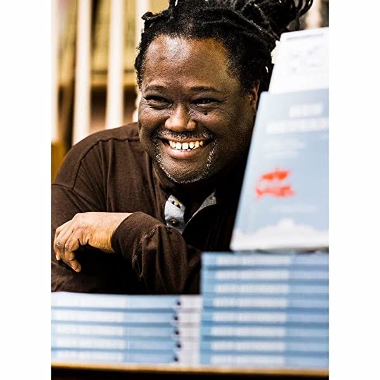
Hello. What work do you do?
My name is A. Rafael Johnson. I’m a novelist, and the Vice-President of Inspire to Change. I specialize in Creative Evaluation, or principles-focused, arts-infused, developmental evaluation for social justice. I believe every word is a social agreement, meaning only what we have collectively agreed it means. However, the legacy of old agreements impacts modern thinking and actions.
Trabajo (Spanish) and travail (French) come from the Latin word trepaliare – to torture, to inflict suffering or agony. Trepaliare is derived from the tripalium – three sticks used to beat enslaved people. In English, work comes from Old English weorc or worc “something done, discrete act performed by someone, action (whether voluntary or required). Weorc is closely related to the words wrikan – to persecute, and wrecan – to drive out, bring about, persecute, punish, or avenge (now wreak).
So for me, work is a loaded term that connotes violence, punishment, and perhaps some sort of exchange for money. If money is paid at all, the people in power control the wages, not the people performing the work. I can imagine an argument that says that we don’t carry these ancient meanings into modern discourse, but I’ve seen penal systems force prisoners to work; my own government withdraw food and medical aid unless the recipient works at a low-paid job; friends who have done sexual work. My ancestors were kidnapped and brought to this country to work the fields, and the ancestors of friends were sent into work camps in Germany and Cambodia. And in evaluation, far too many people and communities have experienced the violence of extractive methods, or seen evaluation work used to punish marginalized people. If also seen evaluators burned out by endless Zoom meetings, reports, analyses, emails – a mountain of work that can never be climbed.
So let’s consider labor – (n): a task or project; (v): toil, tribulation, struggle, suffering, or to endure pain. Labor shares some linguistic DNA with trabajo and travail, but there’s a difference. Labor is usually by choice unless we add an adjective like forced. Labor implies that the person performing the task will gain something for their effort – like going into labor. Labor gives meaning to us; we give meaning to work.
When we consider the labor of evaluation – the struggle, the pain, the eventual rewards – most of what we get isn’t money. We get stronger and more resilient communities, justice and equity in our systems, and a more beautiful world. None of this can be worked but we can endure – we can labor – until we see something new.
Hot Tip: Workism, “the belief that work is not only necessary to economic production, but also the centerpiece of one’s identity and life’s purpose; and the belief that any policy to promote human welfare must always encourage more work” is embedded in many evaluation plans. Seek ways to change that dynamic.
Rad Resources:
- The Atlantic article: Workism is Making Americans Miserable by Derek Thompson.
- The Gift: Creativity and the Artist in the Modern World by Lewis Hyde talks about work and labor.
The American Evaluation Association is celebrating Labor Day Week in Evaluation. The contributions this week explore the concept of labor from different perspective and in relation to evaluation. Do you have questions, concerns, kudos, or content to extend this aea365 contribution? Please add them in the comments section for this post on the aea365 webpage so that we may enrich our community of practice. Would you like to submit an aea365 Tip? Please send a note of interest to aea365@eval.org . aea365 is sponsored by the American Evaluation Association and provides a Tip-a-Day by and for evaluators.

Good labor, Andy!
Love this. Have been thinking about the same things, perhaps not surprisingly–especially in relation to BIPOC and BIWOC and evaluation’s commodification of our identities, relationships, cultural knowledge, and phenotypes without ever shifting that fundamental dynamic of ownership and management, as you say.
In struggle,
Vidhya